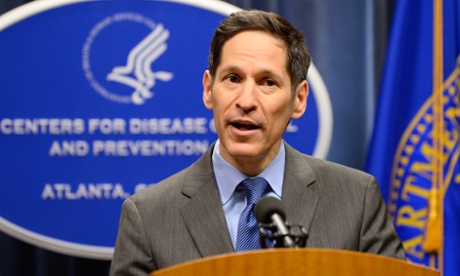Thomas Frieden pointed to temporary re-emergence of the disease in Nigeria as a sign of what happens if protocols not fully followed

The director of the Centers for Disease Control and Prevention (CDC) has warned that Ebola is like a “forest fire” that can re-ignite at any point if all embers are not extinguished, as politicians in Washington prepared to criticise initial mistakes made in responding to its spread in the US.
In prepared testimony ahead of a hearing of a House of Representatives oversight committee, Thomas Frieden pointed to the temporary re-emergence of the disease in Nigeria as a sign of what happens if contact tracing protocols are not fully followed.
“It will take meticulous work and we cannot take short cuts,” he said. “It’s like fighting a forest fire: leave behind one burning ember, one case undetected, and the epidemic could re-ignite.”
“In response to the case in Nigeria, 10 CDC staff and 40 top CDC-trained Nigerian epidemiologists rapidly deployed, identified, and followed 1,000 contacts for 21 days,” added Frieden. “Even with these resources, one case was missed, which resulted in a new cluster of cases in Port Harcourt, Nigeria. However, due to the meticulous work done in Nigeria, no new cases have been identified, and the outbreak appears to have been extinguished there.”
The danger of mistakes is expected to be underlined by the congressmen on the House commerce committee, whose oversight branch is holding the first hearings on the US response on Thursday.
“We cannot afford to look back and say we could have done more,” said full committee Chairman Fred Upton in a statement ahead of the hearing. “The Ebola outbreak is a global public health issue that demands an all-hands-on-deck response.
Other witnesses included Daniel Varga, the chief clinical officer at the Dallas hospital that first treated cases in the US, whose remote testimony included an apology for its handling of the incident.
In pre-submitted evidence, he revealed how the temperature of the first patient Eric Duncan had spiked to 103F during his first visit to the emergency department, yet he was still sent home.
Other witness testimony submitted by the National Institutes of Health described the lengths that drug companies were now going to in order to find a cure or vaccine for Ebola, but Anthony Fauci, Director of the National Institute of Allergy and Infectious Diseases (NIAID) warned that they were still some distance from producing sufficient quantities for widespread trials.
“While NIAID is an active participant in the global effort to address the public health emergency occurring in West Africa, it is important to recognize that we are still in the early stages of understanding how infection with the Ebola virus can be treated and prevented,” he said.
“As we continue to expedite research while enforcing high safety and efficacy standards, the implementation of the public health measures already known to contain prior Ebola virus outbreaks and the implementation of treatment strategies such as fluid and electrolyte replacement are essential to preventing additional infections, treating those already infected, protecting health care providers, and ultimately bringing this epidemic to an end.”
